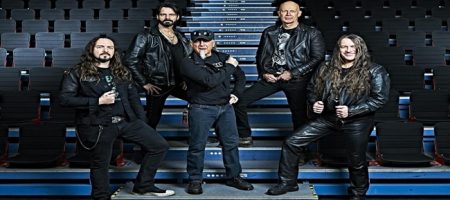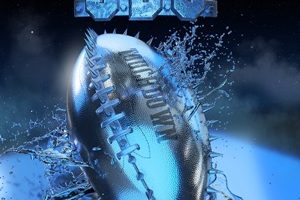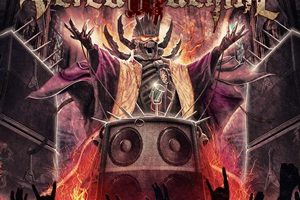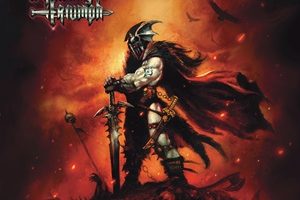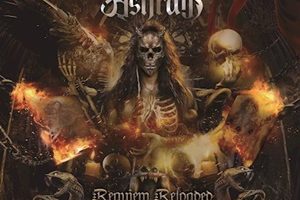Udo Dirkschneider – Leading His Way
Thursday, 28th April 2022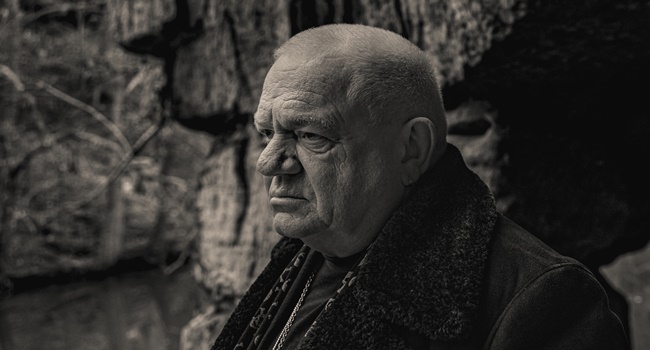
There aren’t many iconic metal singers still releasing albums at age 70. Remaining vital in a scene that has gone through numerous shifts, Udo Dirkschneider continues to deliver classic traditional metal to the masses, performing across the globe and bringing his talent to stages far and wide. Recording an all-covers album called My Way, you’ll get insight into some of his favorite songs of the 60’s, 70’s, and 80’s – metal or otherwise – all given that distinctive Udo touch. It’s always a pleasure to spend more time discussing his discography and work – as you’ll find out more regarding his new label deal with Atomic Fire Records, thoughts on turning 70, fond stories about Motörhead and Lemmy, receiving praise from Brian May of Queen, plus concerns regarding the war in the Ukraine that hit home for one of his U.D.O. bandmates, and hopeful touring plans.
Dead Rhetoric: My Way is the latest album – compiling 17 cover songs spanning numerous genres. Tell us about this record, your specific choices when it comes to the album, and how you felt about exploring some of your influences and favorite songs of the 60’s, 70’s, and 80’s in this special manner?
Udo Dirkschneider: In the first place, it was not planned to do a cover album (laughs). It happened during studio sessions, the first cover song we did was “Faith Healer” from the Alex Harvey Band. It was a song when I was growing up that was played everywhere in rock discos where people were dancing. The song came out great, talking, drinking some wine and beer and then the idea came about doing a whole album of cover songs. It’s difficult to do, and they asked me to make a list of songs I want to do if I were to do a cover album. I made a list, songs I really like from the 60’s, 70’s and the beginning of the 80’s. It was not songs that inspired me, just personal songs I really like.
We worked on two other songs, talked to the record company. In the end here we go, My Way is done, and I am really happy with this album. One very important point was to put my own stamp and character on there, vocal-wise. We did some different arrangements; some songs are a bit harder than the original versions. In the end, I am really happy that I did it.
Dead Rhetoric: Were there any choices that didn’t get approved out of the material you wanted to do?
Dirkschneider: I really could have done a double album with all the choices on the list. There are two songs not on the album, we weren’t able to get the rights for it due to publishing. One was “I’m Down” with the Beatles, also “Don’t Let Me Be Misunderstood” from The Animals. We didn’t get the rights for it, what can you do? I have them here on my computer; I can listen to them on my own time.
Dead Rhetoric: Which songs do you believe were the toughest to do? You have a German song “Kein Zurück” by Wolfshiem, was that hard because of the language and how tough it is to sing with rock music?
Dirkschneider: Yes, you are right. It was the most difficult thing for me to do. It’s on the album, the lyrics, I hope I made sense of it going backwards and forward. My mother language, easy – no, wrong thinking. The German language, it’s a hard thing because the words are really hard, you know. It’s different than English. To get the right meaning out of it, say the words right, it was very difficult for me to do for this album.
Dead Rhetoric: How did it feel to work with ex-Accept mates Peter Baltes and Stefan Kaufmann on this material – did it bring back some fond memories of the early days, especially when jamming on tracks by Tina Turner, Led Zeppelin, The Rolling Stones, The Sweet, and Queen among others?
Dirkschneider: Yeah, Peter (played) the bass guitar on this album. With Stefan, I have been working with him a while- he has been producing, playing guitar with U.D.O., he’s still doing stuff with me, working with me on the vocals for U.D.O. albums. It’s great to have these two guys around. Peter was happy I did “Faith Healer” and the Tina Turner song “Nutbush City Limits”. It’s a song that we would do in the rehearsal room during the early days of Accept. We would play this song as a warm-up song – and I knew I would make a cover of this. Stefan was playing guitar on “Man on a Silver Mountain” by Rainbow, and “Hellraiser” of the Sweet. My old guitarist Mathias Dieth from U.D.O. did “Sympathy” by Uriah Heep, and the rest the rhythm guitars was a guy from Germany, my producer came up with him and he did really good arrangements with. The solos are played by U.D.O. guitar players, and my son did the drums on this album. It was very interesting for him because he never heard a lot of these songs. I call this album – a celebration of people that have worked with me. I’m really happy that I did this, the whole thing.
Dead Rhetoric: Do you have a favorite story or two in all the years knowing Motörhead – as you cover “No Class” on this record?
Dirkschneider: Stories. I’ve been a guest singer a couple of times with Motörhead. I’m really good friends with Mickey Dee, I was good friends with Lemmy. I saw them very often, even with Phil Campbell. I was travelling with them in night liners. One funny story is I was in Cologne, I was a guest singer. I was standing on the monitor desk, waiting for my time to go on stage. They were always like make it louder – and the front of sound guy looked at me and said – look at the board, everything is already in the red. It’s not possible to play anything louder – so he looked him and twisted the knobs. He would look back at the guy and say ‘yeah! Sounds much better!’ (laughs).
I have a lot of funny times with Lemmy, seeing him in Los Angeles at the Rainbow. It’s a shame that he is not with us anymore.
Dead Rhetoric: You are now a part of the Atomic Fire Records roster – a new label with a strong staff who have plenty of experience with prominent metal labels over the decades. What are your thoughts on this new venture for yourself, do you believe they have the right outlook, goals, and visions to take your music and efforts seriously?
Dirkschneider: Yeah. I was together with AFM for over 15 years. We were ready for a new contract, and then Atomic Fire came into the picture. I know the guys; they were working with Nuclear Blast, and they are a real metal gang. Can you imagine changing record labels, they wanted me on the new label? We talked about the business stuff, my management ended up talking with them. We had two meetings together talking about how they see everything. In the end they made a really good offer, the contract is over three studio albums, and I am over 70 years old. And they count this cover albums separate. By the time I am done this contract I’ll be 78 years old or something. I said okay, let’s do it.
Sometimes if you are together a very long time with all the same people, it’s like don’t get me wrong, it’s like a marriage. You love your wife, but a lot of things go the same. I think that’s why we said okay, maybe it’s the last contract forever that I’m doing, so let’s get some fresh blood and let’s see what’s coming up. So far what they’ve done for the covers album, it’s a very good job. I think I did the right thing. AFM may not be so happy, but things happen in this business.
Dead Rhetoric: You made a video rocking out as a janitor for “We Will Rock You” – tell us about the making of that video, did you enjoy the concept? And did you always enjoy the fact that Queen created two different versions of that iconic track, one obviously a bit more rockin’ and heavier than the other?
Dirkschneider: The story about the video. In the beginning it was just planned to put the band on stage and play the song. The director of the video told me that would be quite boring. Everybody is doing that. He came up with some different ideas. In the end, he suggested that I play all the roles on my own. I asked him what he meant. The cleaning guy, listen to the song when he’s cleaning, then the bartender, a deejay, the choir, and in the end in my metal gear singing the song. I said, are you sure it’ll work? He said, yes, it will work. In a way, I always say don’t take everything too seriously. I was laughing a lot during the video shoot. The reaction on this video is like, what is this? They really like the video, I wasn’t so sure when it came out, but the people say they like it. I did another video for the German song, there’s a lot of atmosphere, old pictures.
With Queen, for me it’s a nice story. I always liked the faster version from the Live Killers album. The German guy Peter Koobs who did the rhythm guitar playing and the arranging, he is a good really friend of Brian May. He also was the guitar player in the musical of We Will Rock You. He sent this version to Brian May – Brian May immediately answered, and he said, ‘wow- for the first time somebody did the fast version, not the older one that everyone knows. Say hello to Udo – well done, great playing’. What can I say, that’s an honor for me. I think it’s a good version, it’s an Udo version.
Dead Rhetoric: Your appeal as an artist definitely has reached global proportions – often playing far reaching territories and countries where most rock/metal artists rarely venture or gain popularity. What qualities do you believe your music and work have had to make this international appeal, is it the sincerity and authentic nature to your passion for the music that you believe everyone can relate to?
Dirkschneider: I don’t know. I think you need also a lot of luck to do the right thing at the right moment. I founded Accept a long time ago, before even Peter and Wolf were there. You have a vision, what you want to do. And meet the right people at the right time. Everything fell in together then – you have the luck to catch the people with the music. I remember with the first Accept album, when it came out everybody said, ‘did you hear this new band from England?’. I said, ‘what – we are from Germany!’. Maybe we came at the right time.
Now with U.D.O., I have more albums with U.D.O. than I did with Accept. It still works. It’s not the 80’s like you are playing big halls and stuff like that, but we can still tour worldwide, we can make records that sell, not to say it’s more than the 80’s. People always ask me if I am thinking about retiring, retire for what? These last two years, about the pandemic, we had four shows in two years. I worked a lot in the studio. I always say, as long as I’m having fun, as long as I’m healthy, as long as my voice is working and I can tour nearly the whole world, what’s the sense in sitting at home doing nothing.
Dead Rhetoric: Turning 70 earlier this month, you received numerous birthday well wishes from your bandmates as well as other well-know peers across the metal scene that you posted across social media. How does it feel to be so respected and appreciated for your body of work, and is your drive/ambition still at an all-time high level this deep into your career?
Dirkschneider: Yes. I didn’t expect that much. My son was calling me a day before and said have a look tomorrow on social media, and you’ll see that there’s something going on. Unbelievable. That means… you get something, and you mean something in this business. I have to say thank you very much, that these people say I am an icon, a legend.
Dead Rhetoric: It looks like your touring schedule will be packed from June forward, venturing into South America, Mexico, mainland Europe and Russia going into the rest of 2022. Do you think audiences will be passionate and savoring the live show experience more now than ever, given the lack of opportunities the past few years coming out of the pandemic? Has this been the longest time you’ve been off the road in your career?
Dirkschneider: I think they will be very crazy! (laughs) The only thing that is not possible, it was planned in October to do the Ukraine and Russia. Everybody is canceling it at this moment. For me, I feel sorry for the fans. Russia, the dates were postponed three times. What can I say – it’s a shame to see what’s going on. Especially because I have a Russian guitar player Andrey, but he was living for eight years in the Ukraine, he married a Ukraine woman. He has two daughters there. How can he go out there? It was a nightmare for me, and the rest of the band, management, everything. In the end, it’s really heavy what he went through. He had two choices: we die in the Ukraine, or we leave to get to the Polish border. They drove in a car to the Polish border, and they made it. Now he’s in Germany with the whole family, everyone says thank you.
I saw pictures, unbelievable. They were not on television. Why is this happening in 2022? Who needs this? What can you do? Hopefully very soon this will be over. I don’t think I’ll be able to tour Russia before the next two years. Everything has to calm down, and then we will see what is really going on.
Dead Rhetoric: Where do you think the biggest changes need to take place for humanity in current times for future generations to be able to benefit the most from?
Dirkschneider: The pandemic a little bit changed the whole thinking when you talk about Germany. You are getting closer together, more conversation, not only like five minutes. Everything is more social. We will see how things are, the pandemic is still there. We will see everything getting back to where it was before. It will take a little while. Everything could be going too fast. For me, I travel all over the world. I see so many things. I see things in Russia, Siberia, South America, some stuff in America. It makes you more open-minded to the whole world. When you start discussions with people who go on holiday maybe two times a year, they think it cannot be possible. I’m born in Germany, I live in Germany now, but I lived in Spain also for 13 years. I feel like a European, and a world travel man. You start more thinking about a lot of things. It makes me question a lot more about what’s going on with the war in the Ukraine.
The people now, things will still be the same after a while. At the moment we are looking forward to going on tour. Two times the American tour has been postponed. They are working on dates at the beginning of next year, Canada and America. We will go to Japan as well. Back on the road for me, that’s the most important (thing) for me. Playing in front of people, that’s the main thing I love about being a musician.
Dead Rhetoric: Have you ever had any scary experiences in terms of travel or on stage in all of your time touring the globe?
Dirkschneider: Yes. The worst thing in the last years, we were stopped in America, on the way to Seattle ice was around everywhere. We were stranded there for three days. It was dangerous to go off of the bus, it was so slippery. I had never encountered that before. Weather is changing, the climate is changing. That’s something I remember happening on the last American tour.











